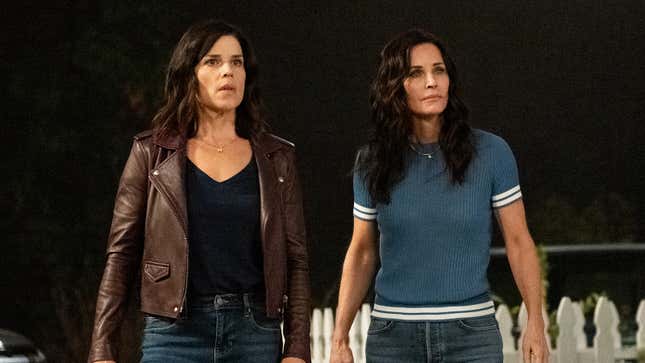The New Scream Movie Is Fun, But Not To Die For
Not quite a reboot, not quite a sequel, Scream (2022) is another solid franchise entry, no more or less.
EntertainmentMovies

The good news is they didn’t fuck it up. The new fifth movie in the Scream franchise, simply titled Scream (and not to be confused with the 1996 original or 2011’s Scream 4, whose title was styled as Scre4m), is the first not to be directed by horror master Wes Craven, who died in 2015. This time, directorial duties are filled by Matt Bettinelli-Olpin and Tyler Gillett (who together helmed the 2019 horror comedy and sleeper hit Ready or Not), and they, along with writers James Vanderbilt and Guy Busick, do a fine job of cranking out another worthy sequel more than 25 years after the original made ribbons out of its horror audience’s expectations.
Sorry, I wrote “sequel,” but this Scream is actually a requel, which as one of its horror scholar characters explains is not quite a reboot, and not quite a sequel. “You’ve gotta build something new—but not too new or the internet goes fucking nuts,” says smarty pants teen Mindy (Jasmin Savoy Brown). “It’s gotta be part of an ongoing storyline even if the story shouldn’t have been ongoing in the first place. New main characters, yes, but supported by and related to legacy characters. Not quite a reboot, not quite a sequel, like the new Halloween, Saw, Terminator, Jurassic Park, Ghostbusters, fuck, even Star Wars, it always, always goes back to the original.” She’s commenting on a new pattern of killings in the perennially beleaguered town of Woodsboro as well as the very movie at hand, naturally. The first real rule of a Scream movie? Its series of developments, no matter how horrific, must fascinate its analytically minded characters.
-

-

-

-

-

-

-

-

-

-

-

-

-

-

-

-

-

-

-

-

-

-

-

-

-

-

-

-

-

-

-

-

-

-

-

-

-

-

-

-








































